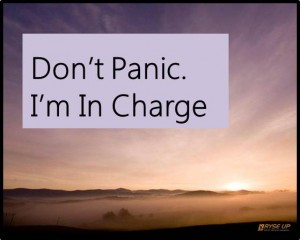How we do something is how we do everything. By that I mean how  we are when we approach the same kind of situations in our life is generally governed by a subconscious pattern we repeat. For me when I hit an emergency situation I automatically step into “Ok I’m in charge” mode and get fired up to organise people, resources and plan what needs to happen. Often that’s a good thing. We all handle these situations differently and I feel I am at my best in that role. Other times it’s not so good and I have to learn when to back off and let others more accustomed to the particular situation be in charge. No judgement here as to what the right response is for anyone, we all react differently and all roles we take on are based on how we feel best to participate, or not.
we are when we approach the same kind of situations in our life is generally governed by a subconscious pattern we repeat. For me when I hit an emergency situation I automatically step into “Ok I’m in charge” mode and get fired up to organise people, resources and plan what needs to happen. Often that’s a good thing. We all handle these situations differently and I feel I am at my best in that role. Other times it’s not so good and I have to learn when to back off and let others more accustomed to the particular situation be in charge. No judgement here as to what the right response is for anyone, we all react differently and all roles we take on are based on how we feel best to participate, or not.
We all have a way that we are, in response to all kinds of things that happen in life.
When autism came into our lives I took it upon myself to be in charge and took an approach to “let’s get this sorted out and resolved”. My thoughts were absolutely rooted in good intentions and with my 18 years in a management consultancy career my triggers got fired and this was my next big project. The big difference was that I really didn’t know what I was dealing with.
Autism was a word I had heard, but had no idea what it was. But that’s Ok I thought, it should be easy enough to find out what it is, what to do and find the people to help. First step was the internet.
First thing I found was a website that offered a solution to autism. Well that wasn’t too hard I thought, why wasn’t I told of this at the hospital. It was a supplement in liquid form that needed to be prepared in a specific way so the good stuff could get to the root of the problem in the brain. The website was American and as much as I tried I couldn’t find the same thing in the UK. Health shops couldn’t help, so I just ordered it in from overseas. We gave this to Tommy and waited to see the improvements. And waited.
Family were asking me what it was and I was trying my best to explain the science behind it that I had read on that website. It seemed logical if hard to describe. Anyway we persevered for at least a year if not more.
Trouble was I didn’t know what to really expect. We were doing this blind with no real understanding of the whole picture of autism. It may have helped, however my expectations for a reversal of his autism didn’t materialise.
I believe many parents like me (that respond in the way I do to such situations) go through a similar stage when they first get the diagnosis. The fact that the diagnosis tends to be received in a hospital or clinic type environment automatically ‘tags’ autism in our conscious mind as a health problem that requires treatment to cure. Now I’m not saying that is or isn’t the case either, just pointing out that we often subconsciously go straight down that path to ‘fix’ something that we understand to be ‘not right’.
Whether you see autism as a health problem to cure or a personality trait to accept (and I will talk more about this in a blog soon) it still remains that most parents start off on this path alone, in the beginning at least, at a time when they are very susceptible to what they read, hear and watch with regards to autism.
We are all different, and as I said at the start of this blog, we can all approach the same situation presented to us in many different ways. There is no right or wrong. Whatever stage you are at with autism in your family right now, know that the experience you have had and the lessons you are learning are all part of the journey for you, your child(ren), family and friends too. We are doing our best.
Just remember to look back now and then on the progress you have made so far. We are often so busy focussed on the road ahead that we forget to look in the rear view mirror to see what’s already behind us and how far we’ve already come.
With love and gratitude,
Nadine.
